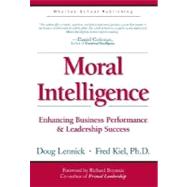
Doug Lennick led 14,000 professionals and support teams at American Express Financial Advisors to unparalleled success. Today, in addition to his work as managing partner of the Lennick Aberman Group, he continues to work directly with American Express Company's CEO, retaining the title of EVP and focusing on workforce culture and performance. He is known worldwide for his expertise in driving business results by improving managers' emotional competence.
Fred Kiel, Ph.D., co-founder of KRW International, Inc., brings over 30 years of experience to his work with Fortune 500 CEOs and senior executives on building organizational effectiveness through leadership excellence and aligning organization with mission. Kiel is often called the "father of executive coaching" for his pioneering work in this field. Before founding KRW, Kiel worked with senior executives in private practice, developing a rigorous data-gathering and customizeddevelopment process designed to provide executives with transformative feedback.
© Copyright Pearson Education. All rights reserved.
| Foreword | xxiii | ||||
| Introduction | xxxi | ||||
|
|||||
|
3 | (16) | |||
|
19 | (18) | |||
|
20 | (1) | |||
|
21 | (1) | |||
|
22 | (1) | |||
|
23 | (1) | |||
|
23 | (1) | |||
|
24 | (1) | |||
|
25 | (1) | |||
|
26 | (3) | |||
|
29 | (1) | |||
|
30 | (1) | |||
|
31 | (2) | |||
|
33 | (4) | |||
|
37 | (26) | |||
|
41 | (2) | |||
|
43 | (2) | |||
|
45 | (4) | |||
|
49 | (2) | |||
|
51 | (2) | |||
|
53 | (4) | |||
|
57 | (1) | |||
|
58 | (1) | |||
|
58 | (1) | |||
|
59 | (4) | |||
|
63 | (16) | |||
|
|||||
|
79 | (14) | |||
|
80 | (2) | |||
|
82 | (5) | |||
|
87 | (2) | |||
|
89 | (4) | |||
|
93 | (12) | |||
|
95 | (2) | |||
|
97 | (3) | |||
|
100 | (5) | |||
|
105 | (10) | |||
|
106 | (3) | |||
|
109 | (3) | |||
|
112 | (3) | |||
|
115 | (26) | |||
|
117 | (2) | |||
|
119 | (2) | |||
|
121 | (1) | |||
|
121 | (2) | |||
|
123 | (1) | |||
|
123 | (4) | |||
|
127 | (1) | |||
|
128 | (1) | |||
|
129 | (3) | |||
|
132 | (3) | |||
|
135 | (6) | |||
|
|||||
|
141 | (16) | |||
|
157 | (28) | |||
|
157 | (2) | |||
|
159 | (1) | |||
|
160 | (1) | |||
|
161 | (2) | |||
|
163 | (1) | |||
|
163 | (3) | |||
|
166 | (7) | |||
|
173 | (3) | |||
|
176 | (2) | |||
|
178 | (1) | |||
|
179 | (1) | |||
|
180 | (2) | |||
|
182 | (1) | |||
|
183 | (1) | |||
|
183 | (2) | |||
|
185 | (22) | |||
|
190 | (14) | |||
|
204 | (3) | |||
|
207 | (8) | |||
|
208 | (1) | |||
|
209 | (1) | |||
|
210 | (1) | |||
|
211 | (1) | |||
|
212 | (2) | |||
|
214 | (1) | |||
|
215 | (12) | |||
|
216 | (1) | |||
|
217 | (1) | |||
|
217 | (1) | |||
|
217 | (1) | |||
|
218 | (1) | |||
|
219 | (1) | |||
|
219 | (1) | |||
|
220 | (2) | |||
|
222 | (1) | |||
|
223 | (1) | |||
|
223 | (1) | |||
|
224 | (1) | |||
|
224 | (1) | |||
|
225 | (1) | |||
|
226 | (1) | |||
|
226 | (1) | |||
|
226 | (1) | |||
|
227 | (8) | |||
|
235 | (6) | |||
|
238 | (1) | |||
|
238 | (3) | |||
|
241 | (8) | |||
|
242 | (1) | |||
|
243 | (1) | |||
|
243 | (1) | |||
|
244 | (1) | |||
|
245 | (1) | |||
|
246 | (3) | |||
| Index | 249 |
The New copy of this book will include any supplemental materials advertised. Please check the title of the book to determine if it should include any access cards, study guides, lab manuals, CDs, etc.
The Used, Rental and eBook copies of this book are not guaranteed to include any supplemental materials. Typically, only the book itself is included. This is true even if the title states it includes any access cards, study guides, lab manuals, CDs, etc.